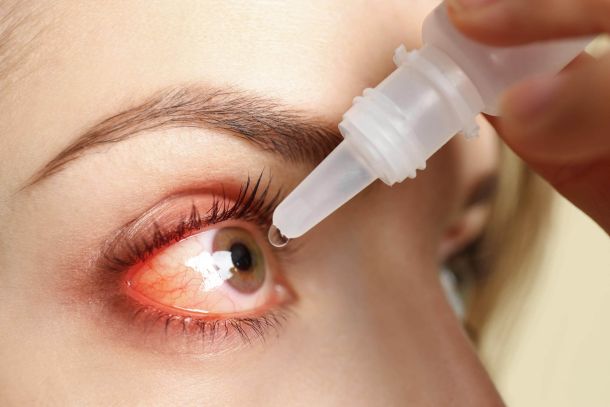How to relieve symptoms of allergic conjunctivitis


Eva Zakharova
Allergic conjunctivitis is a common disease that affects the mucous membrane of the eyes. In this article, an experienced allergist will discuss the causes, symptoms and treatment of allergic conjunctivitis, as well as its prevention.
What is allergic conjunctivitis?
Allergic conjunctivitis is an inflammatory process of the mucous membrane of the eye, caused by the body's allergic reaction to various allergens. The disease may occur in an acute or chronic form. Depending on the cause, allergic conjunctivitis is divided into seasonal, year-round and occupational.
Epidemiology and risk factors
Allergic conjunctivitis is one of the most common ophthalmic diseases. Risk factors include hereditary predisposition, concomitant allergic diseases, and contact with allergens. Allergic conjunctivitis in children may appear at an earlier age than in adults.
Causes of allergic conjunctivitis

Allergic conjunctivitis is caused by exposure to allergens on the mucous membrane of the eyes. The main sources of allergens are:
- Allergens in plant pollen are one of the main causes of seasonal allergic conjunctivitis.
- Dust mites, pet hair and mold are sources of allergens that can cause year-round allergic conjunctivitis.
- Chemicals such as cosmetics, household chemicals and medications can cause allergic conjunctivitis, especially in individuals with occupational contact with these substances.
Upon contact with allergens, an immune reaction begins on the mucosa of the eye, resulting in the production of antibodies. This leads to the release of inflammatory mediators such as histamine and the development of allergic inflammation.
Allergic conjunctivitis often accompanies other allergic diseases such as allergic rhinitis, asthma or atopic dermatitis.
Symptoms of allergic conjunctivitis

Symptoms of allergic conjunctivitis include itching, redness and swelling of the eyes, lacrimation, and a feeling of a foreign body in the eyes. Some patients may have photophobia (sensitivity to light) and mucous discharge from the eyes.
Diagnosis of allergic conjunctivitis
To establish the diagnosis, the doctor performs a comprehensive examination of the patient.
- The doctor collects the patient's medical history, clarifies the nature and duration of symptoms, the presence of contact with possible allergens and associated allergic diseases.
- Laboratory tests include determining the level of IgE antibodies in the blood, and also performing skin tests with allergens to identify possible causes of allergy.
- Differential diagnosis of allergic conjunctivitis is made to rule out other eye conditions such as infectious conjunctivitis, dry eyes, or mechanical irritation.
Treatment of allergic conjunctivitis

Treatment of allergic conjunctivitis is aimed at eliminating contact with allergens, relieving symptoms and preventing the development of complications. An important aspect of treatment is the use of medications.
Medications for the treatment of allergic conjunctivitis
Various medications are used to treat allergic conjunctivitis, including antihistamines, corticosteroids, and local anti-inflammatory agents.
1. Antihistamines such as loratadine, cetirizine, and desloratadine help reduce the symptoms of allergic conjunctivitis when used as tablets. Eye drops with antihistamine action, such as azelastine and olopatadine, may also be used.
2. Corticosteroids, such as hydrocortisone and dexamethasone, are used in the form of eye drops to relieve inflammation and itching in severe forms of allergic conjunctivitis.
3. Topical anti-inflammatories such as ketorolac and nepafenac are used in the form of eye drops to reduce inflammation and itching in allergic conjunctivitis.
Preventing allergic conjunctivitis

To prevent the development of allergic conjunctivitis, contact with allergens must be avoided. Recommendations for prevention include cleaning your home regularly, using hypoallergenic cosmetics and household products, and wearing sunglasses during plant pollen season.
In conclusion, allergic conjunctivitis is a condition caused by contact with allergens and is accompanied by itching, redness and swelling of the eyes. Treatment includes eliminating contact with allergens, relieving symptoms, and using medications such as antihistamines, corticosteroids, and topical anti-inflammatories. Prevention of allergic conjunctivitis involves avoiding contact with allergens and cleaning the home regularly.
New materials
Popular Articles
We recommend reading
Contact us in the Contact Us section to ask questions, offer ideas, or for more information about our allergy resource.
Our articles are your trusted source of allergy knowledge. Learn how to make life with allergic reactions easier on our specialized portal.
©
Lechenie-Allergii.com. All rights reserved.
© Lechenie-Allergii.com. All rights reserved.
The information on this site is for informational purposes only and is not a substitute for professional medical advice. We recommend consulting with qualified medical professionals for accurate information and advice.
 English
English  Українська
Українська  Русский
Русский 









